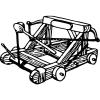Search Results
Showing results 21 to 40 of 91

Balloon Car
Source Institutions
In this physics activity, challenge learners to make and race a balloon-powered car. Learners construct the body out of a paper cup, wheels out of wooden spools. and fuel tank out of a balloon.

Pencil Balance
Source Institutions
In this activity, challenge learners to make a pencil stand on its tip using only two pieces of wire and two clothespins. Use this activity to demonstrate the center of gravity.

Why do Hurricanes go Counterclockwise in the Northern Hemisphere?
Source Institutions
In this kinesthetic activity, learners will play a game with a ball to demonstrate the Coriolis force, which partly explains why hurricanes in the Northern Hemisphere rotate counterclockwise.
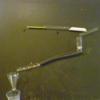
Magnetic Marble Run
Source Institutions
Learners explore magnetism and motion as they build a simple marble run. Learners test different arrangements of plastic and cardboard tubes, bottles, and cups on a magnetic board.

Build a Big Wheel
Source Institutions
In this activity, learners explore how engineers have developed big wheels or Ferris wheels.
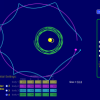
My Solar System
Source Institutions
In this online activity, learners build their own system of heavenly bodies and watch the gravitational ballet.
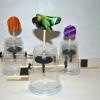
Micro Automata
Source Institutions
In this activity, learners build small animated toys that move.
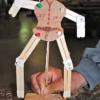
Lever Cowboy
Source Institutions
In this activity, learners build a figure that moves and "comes to life" when they pull its string.

Newton's Cradle
Source Institutions
Build your own version of the classic physics toy using simple materials.

Tinkering with Tops
Source Institutions
In this activity, learners explore the history, design and motion of spinning tops. Learners work in teams of "engineers" to design and build their own tops out of everyday items.
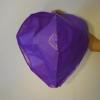
Hot Air Balloon
Source Institutions
In this activity, learners build a hot air balloon using just a few sheets of tissue paper and a hair dryer.
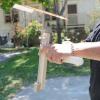
Hand Spin Helicopter
Source Institutions
In this activity, learners build helicopters and launchers using wooden dowels and scrap paper. Use this activity to explore rotational motion and kinetic and potential energy.
Become a Master of Inertia
Source Institutions
In this activity, learners explore inertia as they attempt to whip a strip of paper out from under two coins dangling on the rim of a water glass.
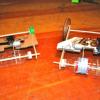
Bottle Cars
Source Institutions
In this activity, learners explore motion, energy, and electricity by constructing bottle cars that run on motors.
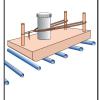
Newton Car
Source Institutions
In this activity, learners work in teams to investigate the relationship between mass, acceleration, and force as described in Newton's second law of motion.
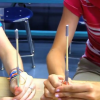
Stretch Your Potential
Source Institutions
In this activity, learners create a toy that demonstrates the First Law of Thermodynamics or the Law of Conservation of Energy.
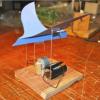
Motor Bird
Source Institutions
In this activity, learners build a bird that flies in place with help from a motor, wire, and some straws.
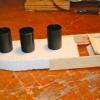
Paddle Boat
Source Institutions
In this activity, learners build an old-fashioned paddle boat out of simple materials.

Visualizing How the Vestibular System Works
Source Institutions
In this activity (page 59 of the PDF), learners spin and observe false eyelashes in jars of water (prepared at least 1 day ahead of time) to investigate the effects of different types of motion on the

